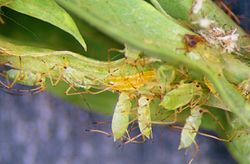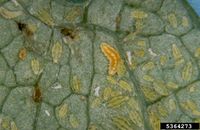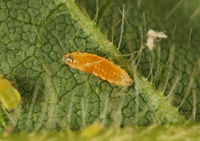Difference between revisions of "Aphidoletes aphidimyza (predator)"
From Pestinfo-Wiki
| Line 4: | Line 4: | ||
<font color="#008000">'''''Aphidoletes aphidimyza'' (predator)'''</font> (Rondani, 1847) | <font color="#008000">'''''Aphidoletes aphidimyza'' (predator)'''</font> (Rondani, 1847) | ||
| − | The gall midge is an important predator of aphids with a cosmopolitan distribution in temperate and subtropical regions. The female midges lay up to 40 eggs eggs on leaves close to aphid colonies and the larvae prey on a large variety of aphid species. | + | The gall midge is an important predator of aphids with a cosmopolitan distribution in temperate and subtropical regions. The female midges lay up to 40 eggs eggs on leaves close to aphid colonies and the larvae prey on a large variety of aphid species. The aphids do not release an alarm pheromone when attacked. |
''A. aphidimyza'' is produced commercially and has been used in greenhouses since the 1970s, sometimes in combination with the aphid parasitoid ''[[Aphelinus abdominalis (parasitoid)|Aphelinus abdominalis]]''. Colonies can be maintained in greenhouses using banker plants. | ''A. aphidimyza'' is produced commercially and has been used in greenhouses since the 1970s, sometimes in combination with the aphid parasitoid ''[[Aphelinus abdominalis (parasitoid)|Aphelinus abdominalis]]''. Colonies can be maintained in greenhouses using banker plants. | ||
Revision as of 18:17, 28 February 2017
| Literature database |
|---|
| 98 articles sorted by: |
| • year (recent ones first) |
| • research topics |
| • countries/regions |
| • list of pest species |

Aphidoletes aphidimyza larva feeding on pea aphids (click on image to enlarge it)
Author(s): Whitney Cranshaw, Colorado State University
Source: Wikimedia Commons
Author(s): Whitney Cranshaw, Colorado State University
Source: Wikimedia Commons
Aphidoletes aphidimyza (predator) (Rondani, 1847)
The gall midge is an important predator of aphids with a cosmopolitan distribution in temperate and subtropical regions. The female midges lay up to 40 eggs eggs on leaves close to aphid colonies and the larvae prey on a large variety of aphid species. The aphids do not release an alarm pheromone when attacked.
A. aphidimyza is produced commercially and has been used in greenhouses since the 1970s, sometimes in combination with the aphid parasitoid Aphelinus abdominalis. Colonies can be maintained in greenhouses using banker plants.
- Other images of Aphidoletes aphidimyza (Wikimedia Commons - click to enlarge)

